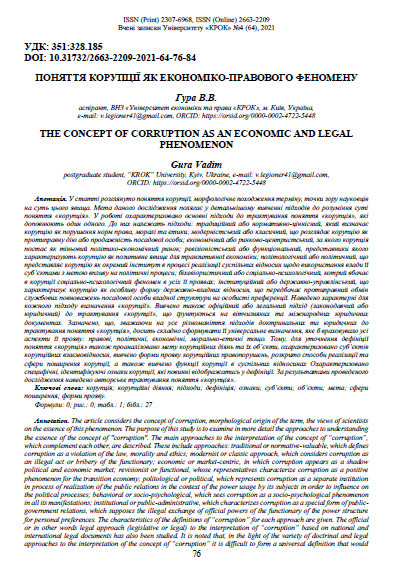THE CONCEPT OF CORRUPTION AS AN ECONOMIC AND LEGAL PHENOMENON
DOI:
https://doi.org/10.31732/2663-2209-2021-64-76-84Keywords:
corruption, acts of corruption, approaches, definition, features, subjects, objects, purpose, spheres of distribution, forms of manifestationAbstract
The article considers the concept of corruption, morphological origin of the term, the views of scientists on the essence of this phenomenon. The purpose of this study is to examine in more detail the approaches to understanding the essence of the concept of "corruption". The main approaches to the interpretation of the concept of “corruption”, which complement each other, are described. These include approaches: traditional or normative-valuable, which defines corruption as a violation of the law, morality and ethics; modernist or classic approach, which considers corruption as an illegal act or bribery of the functionary; economic or market-centric, in which corruption appears as a shadow political and economic market; revisionist or functional, whose representatives characterize corruption as a positive phenomenon for the transition economy; politological or political, which represents corruption as a separate institution in process of realization of the public relations in the context of the power usage by its subjects in order to influence on the political processes; behavioral or socio-psychological, which sees corruption as a socio-psychological phenomenon in all its manifestations; institutional or public-administrative, which characterizes corruption as a special form of public-government relations, which supposes the illegal exchange of official powers of the functionary of the power structure for personal preferences. The characteristics of the definitions of “corruption” for each approach are given. The official or in other words legal approach (legislative or legal) to the interpretation of “corruption” based on national and international legal documents has also been studied. It is noted that, in the light of the variety of doctrinal and legal approaches to the interpretation of the concept of “corruption” it is difficult to form a universal definition that would include all the aspects of its manifestation: legal, political, economic, moral and ethical. Therefore, to clarify the definition of “corruption” the purpose of corruption and their objects have been analyzed, the subjects of corruption have been characterized, the forms of the corruption manifestation have been studied, ways to implement and spread corruption have been unfolded, and the functions of corruption in public relations have been studied. Specific, identifying features of the corruption that should be reflected in the definition have been defined. On the basis of the undertaken study the author’s interpretation of the concept of “corruption” is given.
Downloads
References
Нинюк М., Нинюк І. Корупція як фактор загрози національній безпеці та суспільному ладу України. Історико-правовий часопис. 2015. № 2. С. 71-76.
Пайєтт Д. Українська корупція страшніше російських танків. UkrMedia інтернет-газета. URL: https://ukr.media/politics/238369/.
Індекс сприйняття корупції – 2020 : результати України. URL: https://nabu.gov.ua/en/open-office/biblio/sociologiya/indeks-spriynyattya-korupciyi-2020-rezultati-ukrayini.
Виховання доброчесності та зниження ризиків корупції. Київ: НУОУ ім. Івана Черняховського, 2018. 252 с.
Кінаш М. М. Корупція як соціальне негативне явище. Форум права. 2012. № 4. С. 458-463.
Несневич Ю. А. Проблема концептуализации феномена коррупции. Евразийский Союз: Вопросы международных отношений. 2016. Вып. 1(15). С. 106-119.
Nye J. Corruption and political development: a cost-benefit analysis. American Political Science. 1967. № 12(61). Р. 417-427.
Михненко А. М., Руснак О. В., Мудров А. М. та ін Запобігання та протидія корупції: навч. посібник / за ред. А. М. Михненка. Київ: ДННУ «Акад. фін. управління», 2013. 667 c.
Шостко О. Ю. Кримінологічна характеристика корупційної злочинності в Україні. Питання боротьби зі злочинністю. 2014. Вип. 28. С. 69-78.
Бачинська І. С. Детермінанти корупції в Україні, або чому державні службовці залучені до корупційного процесу. Ефективність державного управління. 2012. Вип. 32. С. 377-382.
Волошенко А. В. Корупція: історичні витоки та сучасні прояви. Економічна теорія та історія економічної думки. 2015. № 3(165). С. 8-16.
Серьогін С. Соціальна сутність корупції в органах державної влади. Актуальні проблеми державного управління. 2010. Вип. 2. С. 130-132. URL: http://nbuv.gov.ua/UJRN/apdyo_2010_2_39
Huntington S. Modernization and Corruption. Political Order in Changing Societies. New Haven, Conn: Yale University Press, 1968. 488 p.
Leyes C. What is the Problem About Corruption? Journal of Modern African Studies. 1965. Vol. 3. № 2. Р. 215-230.
Стогова О. В. Люстрація як передумова ефективно боротьби з корупцією. Сучасне суспільство: політичні науки, соціологічні науки, культурологічні науки. 2016. Вип. 1(13). С. 167-178.
Пірен М., Ребкало В. Запобігання корупції в системі політико-владних відносин сучасного українського суспільства. Вісник Національної академії державного управління при Президентові України. 2011/2. № 4. С. 191-200.
Friedrich C. J. The Pathology of Politics: Violence, Betrayal, Corruption, Secrecy, and Propaganda. N.Y.: Harper &Row, 1972. 287 p.
Луценко М. М., Щербина Л. І. Корупція в Україні: сучасний стан і проблеми протидії. Науковий вісник Міжнародного гуманітарного університету. Серія: Юриспруденція. 2015. Вип. 15(2). С. 142-145.
Левчук А. О. Поняття, сутність корупції та корупційних правопорушень. Юридичний бюлетень. 2019. Вип. 9. С. 171-177.
Трепак В.М. Особливості дефініції поняття «корупція». Науковий вісник Національної академії внутрішніх справ. 2015. № 4. С. 181-194.
Мартинов Д. Ю., Обушна Н. І. Феномен корупції в системі публічного управління: теоретичні аспекти наукового дискурсу. Державне управління: удосконалення та розвиток. 2020. № 8. URL: http://www.dy.nayka.com.ua/?op=1&z=1720
Права человека : Международный сборник договоров. Нью-Йорк: ООН, 1989. 474 с.
Довідковий документ про міжнародну боротьбу з корупцією : підготовлений Секретаріатом ООН, № 169/14. Каїр : ООН, 1995. 47 с.
Про запобігання корупції : Закон України від 14.10.2014. №1700-VII. Чинний зі змінами. URL : https://zakon.rada.gov.ua/laws/show/1700-18#n25
Klitgaard R., Maclean-Abaroa R., Lindsey Parris H. Corrupt Cities: A Practical Guide to Cure and Prevention. ICS Press and World Bank Institute, 2000. 162 p.
П'ясецька-Устич С. В. Теоретичні аспекти аналізу корупції як системного явища в сучасній українській економіці. Причорноморські економічні студії. 2018. Вип. 28-1. С. 19-26.
Варналій З. С., Буркалецька З. С., Саєнко О. С. Економічна безпека України : проблеми та пріоритети зміцнення : монографія. Київ : Знання України, 2011. 299 с.



